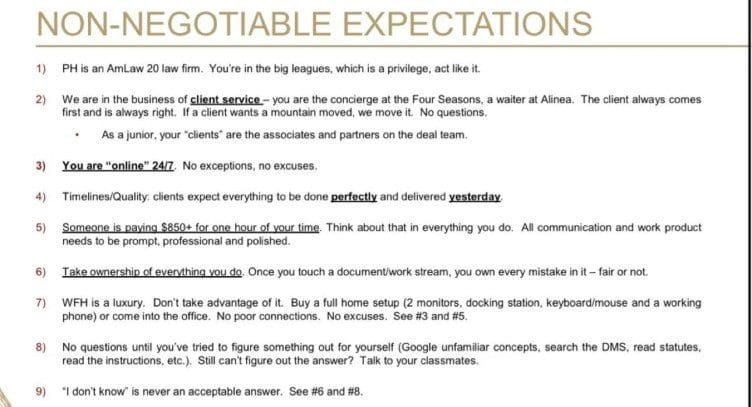The fallout zone – two weeks on from that Paul Hastings slide
I know it’s already disappearing into the mists of time, but if you cast your mind back to the Easter weekend, what do you remember? Some much-needed down-time with the family? Cooking up a storm for Sunday lunch? Lying on the sofa, replete with Lindt chocolate bunnies and/or other Easter-themed confectionery? And whilst thus prone and leisurely digesting, perchance checking your phone and then groaning with dismay when you saw that Paul Hastings slide blow up all over your socials?
Yes, the irony is not lost on me that a presentation slide evincing the very worst excesses of macho-cum-masochistic law-firm culture – including ruff-and tuff talk of being available 24/7 – was being hotly debated and denounced over the Easter weekend, a time when it could be argued that those commenting (and yes, that includes yours truly) should have been practising what they preach and have their phones locked away in a drawer somewhere.
But let’s get real here: there was no way on Earth that a load of fiercely intelligent, highly driven Type A personalities (to be clear, I’m talking about you good folks here – far be it from me to toot my own horn) were going to sit on their hands while this dumpster fire burned away merrily in the background. And so what seemed like the entire legal sector took to Twitter and LinkedIn to comment. I bet the unknown PH associate behind the presentation deck had no idea when creating it that, with all that alpha-lawyer hauteur, they were writing themselves and their firm into such a world of grief.
And here we are, two weeks on, and it’s time for a recap and an examination of the fallout. So what exactly happened?
Here are the CliffsNotes: over the Easter weekend, a leaked slide from a Paul Hastings presentation deck – created by a senior associate and outlining the firm’s “non-negotiable expectations” of its junior lawyers – went viral, mainly for the way that it conformed to every hackneyed, Eighties-era stereotype of Big Law, complete with locker-room, jock-culture cliches (“No exceptions, no excuses”), like Al Pacino dressing down his team in Any Given Sunday. It read like a belated April Fools joke, but is, sadly, very real.
Here we see everything that has ever been wrong with the culture in our industry, now lit up in the flashing neon of massive public scrutiny: junior lawyers being hectored to satisfy the iniquitous and frankly impossible demands (delivering things “yesterday”, for example) of their bullying bosses. A good lawyer aspires to be a consiglieri to their clients (think Thom Hagen in The Godfather); yet PH’s junior lawyers are told here that they are “a concierge at the Four Seasons”. They are also told that they have to take the blame for every mistake in every work stream they ever touch, and that the client is always right. And in some ways perhaps the worst bullet point of them all: they are told that “‘I don’t know’ is never an acceptable answer”. If that isn’t a recipe for disaster, I don’t know what is.
The slide and everything it represented was bad enough, but the reaction, or lack thereof, from Paul Hastings in the aftermath was even worse. First we had the statement saying that the slide was “prepared by an associate and the views expressed do not reflect the views of the firm or its partners” – a terrible example of disavowal and blame-shifting, with no collective ownership of the mistake – and then…zilch. Yawning silence. Scroll back through the firm’s LinkedIn posts and it’s simply business as usual. At least Nero fiddled while Rome burned; Paul Hastings’ senior management seemingly did nothing as this PR disaster raged on.
And there was much to scream about, as the fallout in the form of online commentary and media coverage continued for days. Here is a round-up of some of it:
- I’m going to throw my own hat in the ring with this LinkedIn post, in which I discuss the similarities between this situation and the scandal that came to be known as “Paddingate” 20 years earlier. Alone the brilliant comments from Leah Steele, an expert in combating burnout, and fellow legal marketing expert Helen Burness make this worth a read, in my opinion (also see Helen’s post her own “non-negotiables”).
- The Lawyer also runs with the Paddingate angle in its examination of the individual points in the slide and the extent to which they map onto the realities of many within the industry – read the piece here.
- The question of whether the culture portrayed in the slide is that far off from the reality experienced by some junior lawyers is also explored by LegalCheek’s insightful article here.
- Writing for Bloomberg, Hogan Lovells’ Sean Marotta provides his version of what the slide could have said if written from a place of compassion and team spirit while still giving young lawyers straight talk about the realities of working for an AL20 firm. Read it here.
- Legal recruiter Keith Fall had a hot take that ran counter to almost everyone else, calling the outlined expectations “refreshing rules to live by”. Most of the 784 commentators on his post disagree with him, including EY’s John Dieffenbach, who posted a point-by-point rewrite of the slide, concluding with point 10: “This is your career. Don’t waste any of it at Paul Hastings.” Ouch.
- The American Lawyer reflected on what the PH slide says about reinforcement culture throughout a firm – take a look here.
- Also in The American Lawyer is this piece featuring in-house reaction to the slide – not all of it negative!
There’s that old adage that there’s no such thing as bad publicity, but I’m not so sure. And I bet the head honchos at Paul Hastings aren’t, either. Still, I guess this may yet all prove to have been the proverbial storm in a tea-cup, and mainly of interest to industry insiders. Will it put off prospective clients? Somehow, I doubt it.
But I also wouldn’t be surprised if, in the months and years to come, many a bright young spark contemplating a career in law will give Paul Hastings and other Big Law firms a swerve when these prospective candidates do their due-diligence research online and perhaps have their worst fears confirmed as to the culture they might encounter. For better and often for worse, stories like this one leave an indelible record behind – the Internet is forever.
All work and no play
I recently ran a poll, asking people in my LinkedIn network whether or not they were working on Easter Monday, a public holiday here in the UK. The results showed that most (75%) of the 57 respondents were not working (though they were obviously scrolling through and posting on LinkedIn, as was I – the same flavour of irony as mentioned in the previous article).
Clearly, my connections – most of whom work in or adjacent to the legal sector – are mavericks who like to buck trends: as reported in LegalCheek this week, recent research has shown that, compared to people working in other sectors, lawyers are twice as likely to work on their days off. In fact, no fewer than 37% of them had done so in the last 12 months.
Conducted by an unlikely-seeming organisation, the disposable vape and vape kit retailer Vape Club, the study of over 1,000 UK employees also showed that a third of legal-sector workers had suffered from increased anxiety over the past 12 months, with 33% citing excessive stress. According to the research, “a fifth (20%) of legal professionals had experienced mental health issues – double those with physical health concerns arising from work. And declining mental health was three times more common than improving mental health.
It seems that it’s not just Paul Hastings that has a culture problem – our industry as a whole seems to have quite a negative impact on a significant proportion of the people who work within it. Overwork seems to be a root cause of much of this. But there is cause for hope, and many people are beginning to push back against the ‘always-on’ ethos. I know of, and am good friends with, many happy, satisfied legal professionals who have escaped the traditional paradigm of the grind. Hopefully, you are one of them. If not, please reach out – I know a lot of lovely people that can help.
SRA backed by Legal Services Board to tackle toxic work cultures
Here at Si’s Matters, we have previously reported on the Solicitors Regulation Authority’s (SRA) new rules designed to root out toxic workplace behaviour, mainly by requiring senior managers to call out unfair behaviour. Now the SRA’s plans have received the full and official backing of the Legal Services Board (LSB), the Law Gazette has reported.
The proposed changes to the SRA’s code of conduct make it an explicit requirement to treat staff fairly and with respect. The reforms are part of a wider drive by the SRA to combat toxic work cultures in the wake of stories of workplace bullying, discrimination and other unsavoury conduct. On Wednesday, the LSB granted in full the SRA’s application to make the changes to its rules relating to health and wellbeing. For a more in-depth look at this story, please read here.
The winter of our discontent made glorious summer?
As you will all know, much of the economic news over the past few months has made for pretty grim reading. The coverage during the winter often revolved around the energy crisis, rising consumer prices, rising inflation and the general cost-of-living crisis. To use some good, old-fashioned British understatement, the mood music from the British economy was a tad bleak at times.
Whisper it, but there are tentative signs that this might be set to change. Last week, the FT carried a story that the UK economy has finally risen above pre-Covid levels, according to data from the Office for National Statistics. And in his response to the news, Chancellor Jeremy Hunt stated that the economic outlook was “looking brighter than expected”, adding: “We are set to avoid recession thanks to the steps we have taken through a massive package of cost-of-living support for families and radical reforms to boost the jobs market and business investment.” He concluded by saying that “Britain’s economy is back”.
While it is always sensible to take government ministers’ bombast with a healthy pinch of salt, there does seem to be a greater air of optimism around. There are certainly signs of growing confidence amongst larger companies, as a recent Deloitte survey of CFOs shows. According to this, 25% more chief financial officers are feeling better about the future than worse, up 8 percentage points from three months ago. This is the biggest uptick in confidence since the rollout of the coronavirus vaccine, the study states.
Obviously, the ongoing issues of high inflation and high consumer prices have not vanished into thin air. These are long-term, systemic problems. But the fact that the UK economy has outperformed some of the more Eeyore-ish predictions from earlier in the year has put a spring in consumers’ steps. It’s a good bit of news as we move towards the summer months. Here’s hoping that metaphor and reality combine to give us a glorious summer after such a winter of discontent.
Eversheds announces 29 new partnership promotions
There certainly seems to be optimism aplenty at Eversheds, with the news that the firm has just promoted 29 associates to partner. Though this represents a slight fall on last year’s 31 promotions, it is still something to be celebrated at a time when it is far too easy to find the negative legal-sector stories. We congratulate all the newly minted partners and wish them every success in this next stage of their careers.
Barrister becomes West End actor – and plays a judge
Speaking of new career phases in the law, my eye was caught this week by the story in LegalCheek about a barrister who has swapped the bar for the boards by going to drama school – and now landing a West End role playing the judge in Vardy v Rooney: The Wagatha Christie Trial. I can’t help thinking that Verna Vyas’ previous work experience will help her bring great verisimilitude to the role. You can read more here.
Thanks for reading, I hope you’ve enjoyed this week’s edition.







